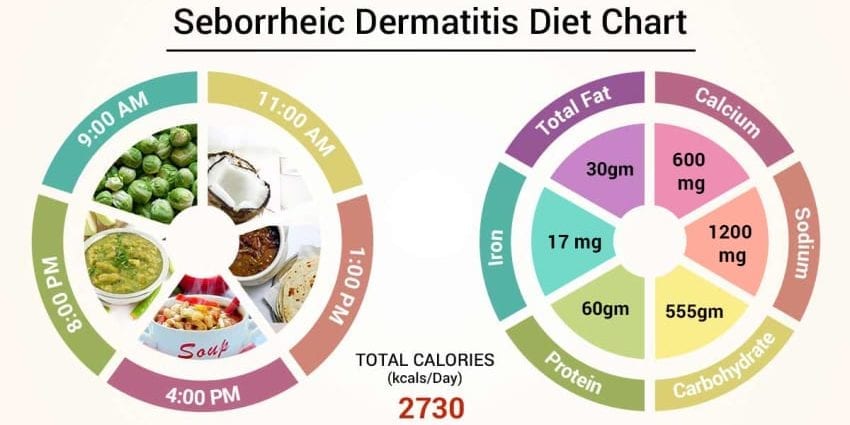Contents
general description
Dermatitis is an inflammatory reaction of the skin to an external stimulus.
Types of dermatitis:
- contact type of dermatitis occurs when an irritating substance comes into direct contact with the skin;
- toxidermia – the irritant has entered the body, and acts on it from the inside;
- seborrhea;
- allergy;
- eczema.
Causes:
The most common causes of simple dermatitis can be radiation and temperature exposure, pressure and friction of the skin, contact with acid and alkali, bioburns of plants. Allergic dermatitis appears some time after contact with an irritant. Atopic dermatitis can be genetically transmitted and manifests itself when exposed to irritants in food, air, or direct contact.
Symptoms:
simple forms of dermatitis appear in the form of pain, burning, itching and blistering on the skin, while chronic forms are accompanied by the appearance of edema, peeling, cracks, and necrosis of the skin.
Useful products for dermatitis
The main principle of the diet, with the manifestations of dermatitis, is “the exclusion of foods that can provoke allergic skin reactions.” In addition, you should eat foods that promote the process of renewal and regeneration of skin cells:
- porridge cooked in water (oatmeal, rice, millet, corn, buckwheat, pearl barley);
- vegetables (turnips, zucchini, squash, cabbage);
- boiled meat (turkey meat, beef, rabbit, lean pork);
- fruits without allergens, rich in plant fiber and B vitamins (unsweetened sour apples with green peel, pears and plums, gooseberries, currants, watermelon);
- goat milk, natural fermented milk products (for example: yogurt with probiotics, starter cultures and kefir);
- certain types of fish with a high content of omega-3 fatty acids (sardine, herring, salmon, anchovies);
- oolong tea, which is rich in antioxidants and tannins;
- natural juices, fresh fruit drinks and fruit drinks from fresh fruits, vegetables and berries;
- sea kale;
- purified water (at the rate of 30 ml per kilogram of body weight per day);
- vegetable oil (sunflower and olive) – up to 30 grams per day.
Traditional medicine for the treatment of dermatitis
- dill essential oil a teaspoon twice a day;
- lemon juice, diluted with water in a ratio of one to one;
- infusion of the following herbs: black elderberry, prickly hawthorn, parsley root with leaves, lavender, deaf nettle, chicory herb (a mixture of herbs is formed in equal proportions of ingredients);
- infusion of blackberry leaves;
- decoction of oak bark with honey;
- grated raw potatoes (put the mass wrapped in cheesecloth for several hours to the places of manifestation of dermatitis);
- geranium oil;
- decoction of periwinkle;
- lemon balm tea;
- infusion of Japanese Sophora;
- infusion of cornflower flowers;
- a compress made from freshly made aloe juice;
- dandelion juice in a decoction;
- celery root juice;
- ointment from licorice root and butter.
Dangerous and harmful products for dermatitis
These include all foods that are known to cause disease. In addition, foods that contain coarse fibers, as well as spicy, hot, spicy foods that poison the already damaged oral mucosa. Also, be sure to exclude from the diet smoked and pickled food, fast food products (hamburgers, croutons, chips, fries), foods with a high content of sugar and simple carbohydrates (pastries, cakes, pastries and other sweets). For chronic types of dermatitis, many types of fish, eggs, soy products, caviar, mushrooms, beets, carrots and tomatoes, chocolate and cocoa bean products, honey, red berries, citrus fruits, nuts, wheat and rye bread should be avoided. In the daily diet, you should reduce the amount of potatoes, corn, buckwheat, cranberries, green peppers, lamb, apricots, peaches.
Attention!
The administration is not responsible for any attempt to use the information provided, and does not guarantee that it will not harm you personally. The materials cannot be used to prescribe treatment and make a diagnosis. Always consult your specialist doctor!










